Contents
Market Overview
Macro Review
Global monetary tightening dominates. The combination of the Fed’s 75bp hike, with G10 tightening weighed on markets across the UK, Norway, and Switzerland. It didn’t stop there as EM central banks out of South Africa, Taiwan, Indonesia and the Philippines also lifted policy rates. In fact, there were sixteen central bank policy updates within 24 hours of the Federal Reserve decision. However, Brazil had taken the first step in ending its hiking cycle as it kept rates unchanged at 13.75%, but less can be said for Turkey’s 100bp cut. The DM theme of a Powell pivot at the July FOMC is firmly in the rear-view mirror after Jackson Hole and the latest, more hawkish FOMC. The bleaker U.S. outlook in 2022 carries forward into 2023, but the focus on inflation-over-growth has seen rates rise for the wrong reasons. Indeed, the strength in DXY hit a 20-year high with U.S. Treasuries widening 14-35bp. More pressure came from Europe as German bunds and UK gilts widened 11-37bp and 50-93bp, respectively. The major headlines were that the U.S. 2-year Treasury broke through 4% and the 10-year note rose above 3.50%, as the entire curve inverted across every tenor variant (2s10s is the most inverted since 1981). The BoE may have only hiked 50bp but the focus was on the mini-Budget and unnecessary tax cuts causing GBP to plummet to lows not seen since 1985 and the 5-year gilt widened by its largest factor in a single day ever (57bp intraday widening). Meanwhile, the Bank of Japan remained dovish and YCC is set to remain, although FX intervention for the first time since 1998 saw a brief respite in JPY. Weekend developments will focus on elections. Italy is increasingly closer to electing a far-right leader (Georgia Meloni) from the Brothers of Italy party, while Russian-enforced local referenda will take place in the Ukrainian provinces of Luhansk, Donetsk, Kherson and Zaporizhzhia and run until Tuesday.
EM Credit Update
Emerging market sovereign credit (cash bonds) ended the week down 1.0% with spreads 3bp tighter, with the EMBI back above 500bp in spread. Outperformers over the week were El Salvador, Tunisia and Ghana while Sri Lanka, Ukraine and Tajikistan underperformed. EM spreads remain elevated and key index yields are becoming attractive. We note that U.S. IG yields have risen above 5% for the first time since 2009. Bank of America also highlighted that with a 5% IG corporate yield, it implies an 8% 12-month return assuming a spread target of 130bp for the asset class. We would add that further comfort in U.S. IG will have a better prospect for emerging markets.
EM credit ETFs were more volatile than cash indices this week. The EM Sovereign ETF (EMB) was down -2.9%, which was in line with U.S. HY (-2.6%) and broadly with U.S. IG (LQD -2.0%). The weakness in fixed income was clearly driven by core rates but more in the front-end as the long-dated U.S. Treasuries via TLT was down only 0.7%. Meanwhile, EM credit outperformed EM equities as EEM was down -4.8% this week. DM equities with the S&P 500, Nasdaq and Russell 2000 fared poorly (SPY and QQQ -4.9%, then IWM -7.0%). The weakness in EM equities was surprisingly driven by the lower beta part of the index as Chile (-9.1%), the Philippines (-7.4%) and South Korea (-7.0%) lagged, while Turkey was only down 3.5% and Brazil was the clear outperformer (+2.3%). The strength of EM was more visible in credit default swap indices. The iTraxx Main (European IG) and Xover (European HY) indices were 18bp and 84bp wider, relative to CDX IG (U.S. IG) and CDX HY (U.S. HY) that were 17bp and 42bp wider, respectively, with CDX EM only 4bp wider. EM credit risk clearly outperformed DM handsomely this week.
The Week Ahead
Chinese PMIs and Eurozone inflation are the major events as markets digest the latest round of DM tightening. Germany’s Ifo Survey and HICP inflation will invariably be in focus with consensus set at 10.4% after 8.8% previously and follows a slump in German PMIs on Friday. Key EM interest rate decisions rest with Colombia (9.0%), Czech Republic (7.0%), Ghana (22.0%), Hungary (11.75%), India (5.4%), Kenya (7.5%), Nigeria (14.0%) and Thailand (0.75%). Then, while Brazil held its Selic rate unchanged at 13.75% last week, the publication of minutes will provide an interesting view of how MPC members are thinking about the inflation landscape. While inflation may be moderating in Brazil, Poland’s headline figure is set to rise to 16.6% as core inflation breaks into double digits.
Highlights from emerging markets discussed below include: President Putin orders a partial mobilization, threatens to “use all available means” to protect Russia; Argentina reaches a staff-level agreement (SLA) with the IMF on the second program review; and Ecuador secures better repayment terms on existing loans from China and targets a new IMF program in 2023.
Fixed Income
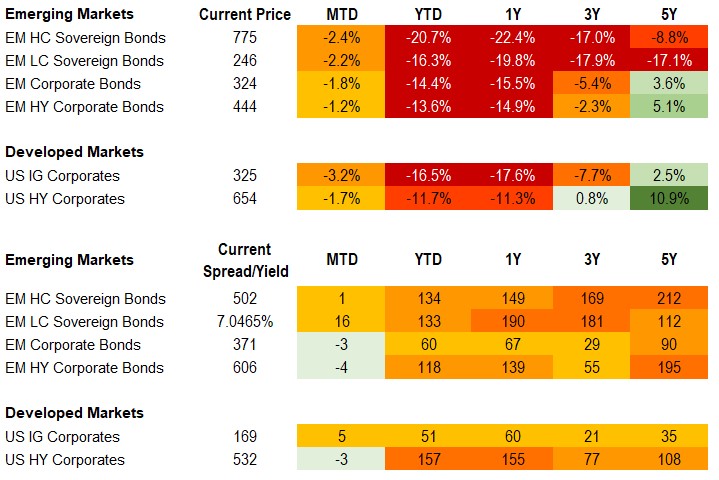
Equities
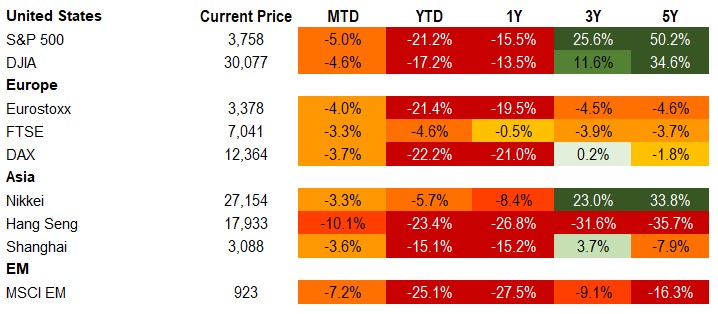
Commodities

Source for data tables: Bloomberg, JPMorgan, Gramercy. EM Fixed Income is represented by the following JPMorgan Indicies: EMBI Global, GBI-EM Global Diversified, CEMBI Broad Diversified and CEMBI Broad High Yield. DM Fixed Income is represented by the JPMorgan JULI Total Return Index and Domestic High Yield Index. Fixed Income, Equity and Commodity data is as of September 23, 2022 (mid-afternoon).
Emerging Markets Weekly Highlights
President Putin orders a partial mobilization, threatens to “use all available means” to protect Russia
Event: Russia’s President, Vladimir Putin, announced in a televised address to the nation that as many as 300,000 reservists are being called to military service in a partial mobilization. Meanwhile, preparations for so called “annexation referendums” in four Ukrainian regions occupied by Russian troops have been accelerated and the Kremlin has vowed to support the “decisions taken” by the votes scheduled to take place between September 23 and 27.
Gramercy commentary: After months of labeling the invasion of Ukraine a “special military operation” and criminalizing the use of the term “war” to describe it, Russia’s partial mobilization, the first to take place in the country since World War II, seems to be a clear confirmation that the situation in Ukraine has quickly deteriorated from the Kremlin’s perspective. The mobilization is unlikely to be a game-changer on the battlefield as it is almost certain to present a major logistical challenge for Russia’s stretched military and will take months to yield tangible results, if any. In the meantime, Ukraine’s military appears to be enjoying an increasingly stronger momentum and is determined to continue to press its advantage further. This is a concerning combination, especially in the context of the upcoming referendums in the four Russia-occupied regions of Ukraine: the so-called Donetsk and Luhansk People’s Republics, Kherson and Zaporizhzhia. There is little doubt that all four referendums will approve Russia annexing the regions. Most of the international community will not recognize the results, but President Putin has already committed to “support the decisions taken”. As such, we believe the conflict is entering yet another more dangerous stage as Ukrainian forces are likely to continue their efforts to liberate areas that Russia would now consider its “sovereign territory” and has threatened to use “all the means at our disposal” to defend them. In this context, we see significant risks of escalation in diplomatic rhetoric between Russia and the West and increasing geopolitical risks for global markets in the coming weeks just as they are grappling with the effects of rising U.S. rates.
Argentina reaches a staff-level agreement (SLA) with the IMF on the second program review
Event: The IMF announced that its staff and the Argentine authorities have reached an SLA on an updated macroeconomic framework and associated policies necessary to complete the second review under Argentina’s 30-month EFF arrangement. Upon completion of a review and approval by the IMF Executive Board, Argentina would have access to about $4.0bn.
Gramercy commentary: The agreement was largely expected by markets as it was well telegraphed by the IMF’s Managing Director, Kristalina Georgieva after meeting with Argentina’s Economy Minister, Sergio Massa last week. Nevertheless, it is a clear confirmation that the program is on track and the two sides remain interested in cooperating. In a statement accompanying the agreement, the IMF commended the authorities for decisive policy actions aimed at correcting earlier setbacks that are helping to restore confidence and strengthen macroeconomic stability, including by rebuilding international reserves. At this stage, the IMF’s Executive Board approval in the coming weeks appears to be only a formality. Overall, the relationship between the Fund and Argentina’s authorities appears to have benefited significantly under Massa pragmatism and ability to execute policy has helped ease market concerns triggered by Guzman’s departure and Batakis’ very brief stint as Economy Minister. Looking ahead, economic policy management is likely to become more challenging as we get closer to the October 2023 elections. However, we remain of the view that as long as Massa is successful in engineering a muddle through between now and the elections, it should help to re-anchor the floor and set the stage for gradual credit-positive moderation in policy approach over the medium-term.
Ecuador secures better repayment terms on existing loans from China and targets a new IMF program in 2023
Event: Ecuador’s government announced that an agreement has been reached with two Chinese state-owned banks on more favorable repayment terms for $3.2bn of existing debt. Meanwhile, the Minister of Finance, Pablo Arosemena signaled that the authorities are looking to secure a new IMF program when the current one expires in December.
Gramercy commentary: The agreement was largely expected by markets as it was well telegraphed by the IMF’s Managing Director, Kristalina Georgieva after meeting with Argentina’s Economy Minister, Sergio Massa last week. Nevertheless, it is a clear confirmation that the program is on track and the two sides remain interested in cooperating. In a statement accompanying the agreement, the IMF commended the authorities for decisive policy actions aimed at correcting earlier setbacks that are helping to restore confidence and strengthen macroeconomic stability, including by rebuilding international reserves. At this stage, the IMF’s Executive Board approval in the coming weeks appears to be only a formality. Overall, the relationship between the Fund and Argentina’s authorities appears to have benefited significantly under Massa pragmatism and ability to execute policy has helped ease market concerns triggered by Guzman’s departure and Batakis’ very brief stint as Economy Minister. Looking ahead, economic policy management is likely to become more challenging as we get closer to the October 2023 elections. However, we remain of the view that as long as Massa is successful in engineering a muddle through between now and the elections, it should help to re-anchor the floor and set the stage for gradual credit-positive moderation in policy approach over the medium-term.
Emerging Markets Technicals
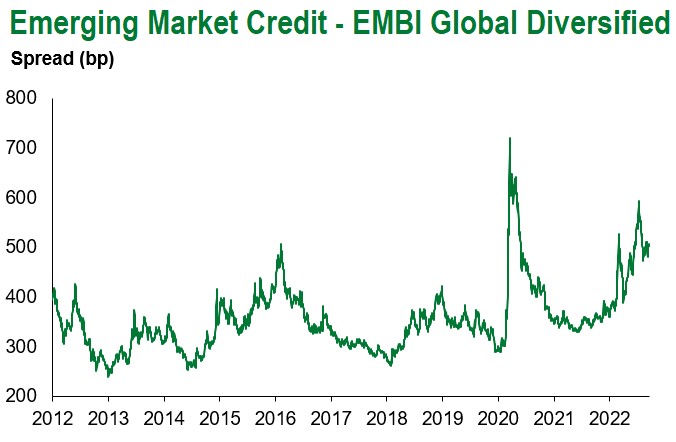
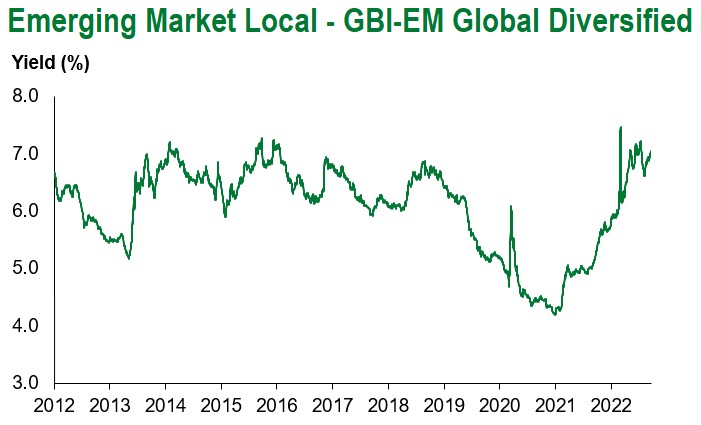
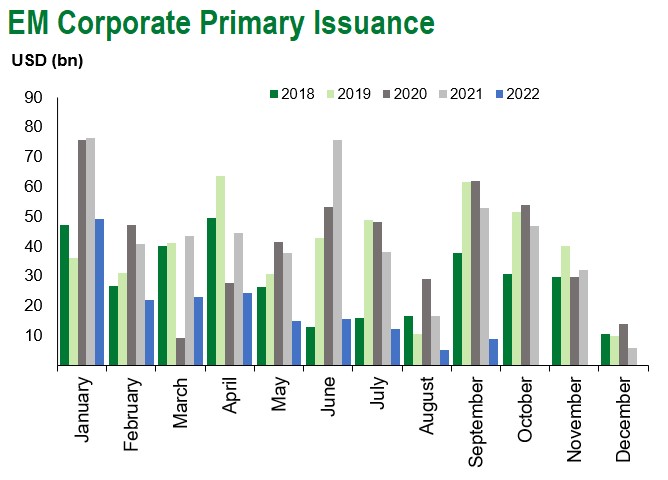
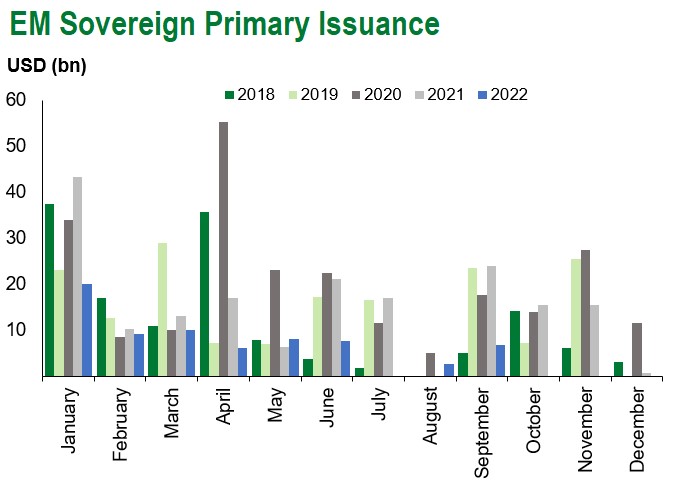
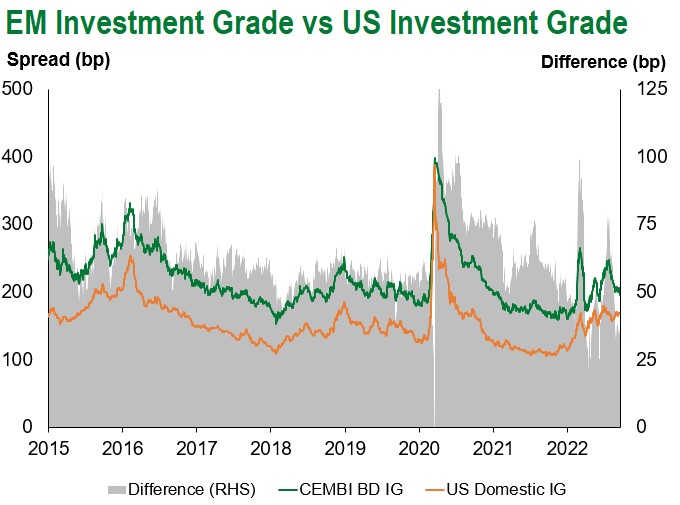
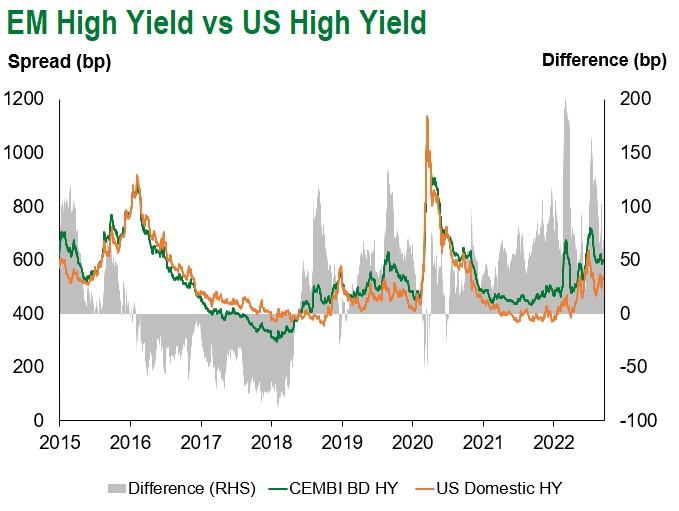
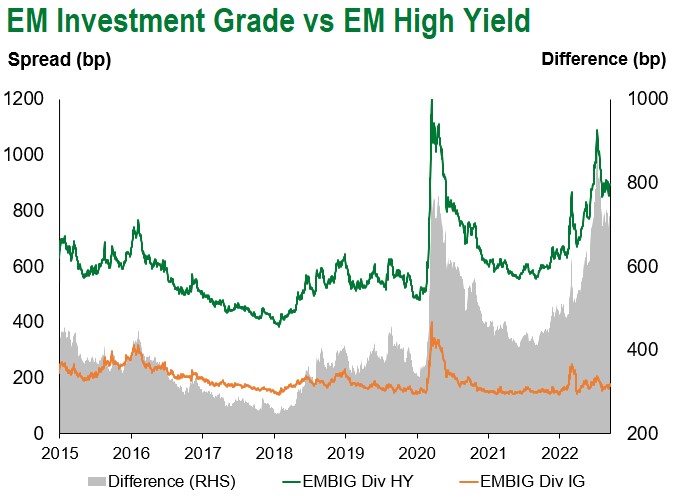
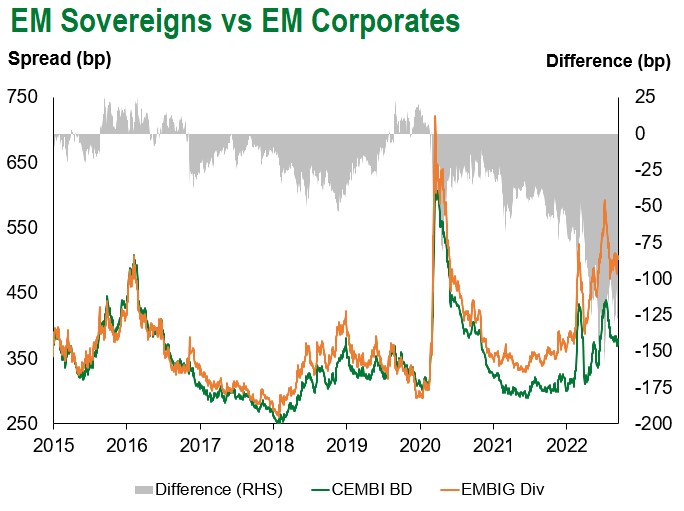
Emerging Markets Flows
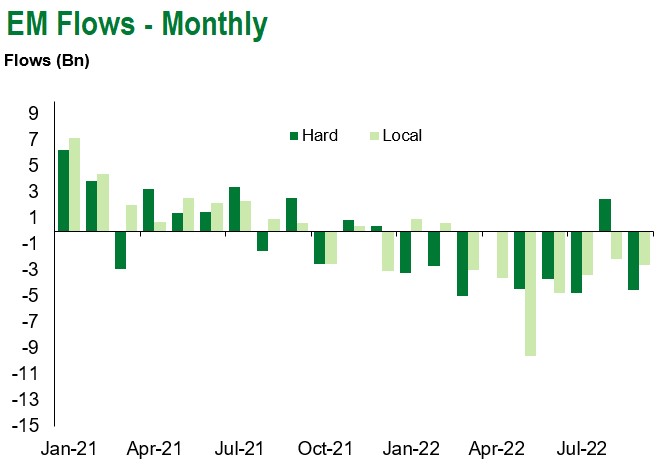
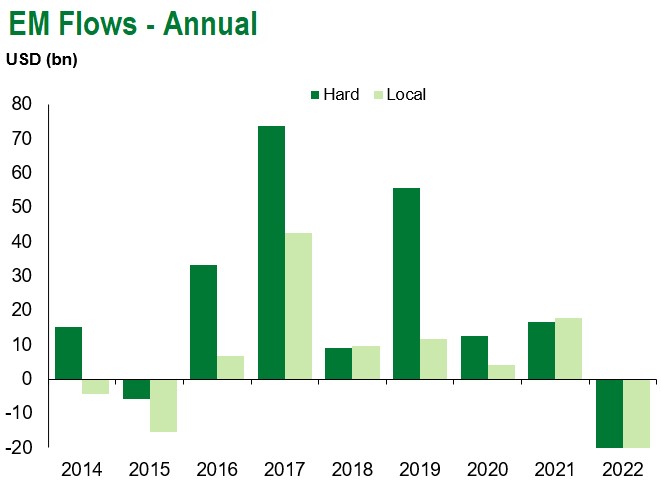
Source for graphs: Bloomberg, JPMorgan, Gramercy. As of September 23, 2022.
COVID Resources:
Johns Hopkins COVID-19 Case Tracker
For questions, please contact:
Kathryn Exum, CFA ESG, Director, Co-Head of Sovereign Research, [email protected]
Petar Atanasov, Director, Co-Head of Sovereign Research, [email protected]
James Barry, Director, Deputy Portfolio Manager, [email protected]
This document is for informational purposes only. The information presented is not intended to be relied upon as a forecast, research or investment advice, and is not a recommendation, offer or solicitation to buy or sell any securities or to adopt any investment strategy. Gramercy may have current investment positions in the securities or sovereigns mentioned above. The information and opinions contained in this paper are as of the date of initial publication, derived from proprietary and nonproprietary sources deemed by Gramercy to be reliable, are not necessarily all-inclusive and are not guaranteed as to accuracy. This paper may contain “forward-looking” information that is not purely historical in nature. Such information may include, among other things, projections and forecasts. There is no guarantee that any forecasts made will come to pass. Reliance upon information in this paper is at the sole discretion of the reader. You should not rely on this presentation as the basis upon which to make an investment decision. Investment involves risk. There can be no assurance that investment objectives will be achieved. Investors must be prepared to bear the risk of a total loss of their investment. These risks are often heightened for investments in emerging/developing markets or smaller capital markets. International investing involves risks, including risks related to foreign currency, limited liquidity, less government regulation, and the possibility of substantial volatility due to adverse political, economic or other developments. References to any indices are for informational and general comparative purposes only. The performance data of various indices mentioned in this update are updated and released on a periodic basis before finalization. The performance data of various indices presented herein was current as of the date of the presentation. Please refer to data returns of the separate indices if you desire additional or updated information. Indices are unmanaged, and their performance results do not reflect the impact of fees, expenses, or taxes that may be incurred through an investment with Gramercy. Returns for indices assume dividend reinvestment. An investment cannot be made directly in an index. Accordingly, comparing results shown to those of such indices may be of limited use. The information provided herein is neither tax nor legal advice. Investors should speak to their tax professional for specific information regarding their tax situation.
